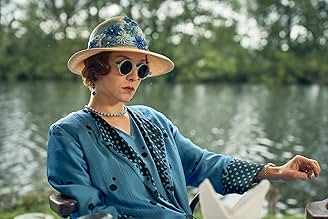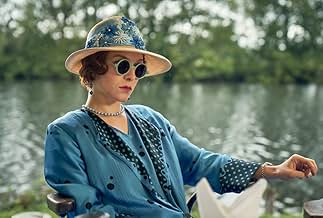AVALIAÇÃO DA IMDb
6,1/10
5,7 mil
SUA AVALIAÇÃO
Uma criada que vive em Inglaterra após a Primeira Guerra Mundial planeia encontrar-se secretamente com o homem que ama antes de ele partir para casar com outra mulher.Uma criada que vive em Inglaterra após a Primeira Guerra Mundial planeia encontrar-se secretamente com o homem que ama antes de ele partir para casar com outra mulher.Uma criada que vive em Inglaterra após a Primeira Guerra Mundial planeia encontrar-se secretamente com o homem que ama antes de ele partir para casar com outra mulher.
- Prêmios
- 2 indicações no total
Nathan Chester Reeve
- Dick
- (as Nathan Reeve)
Sope Dirisu
- Donald
- (as Sope Dìrísù)
- Direção
- Roteiristas
- Elenco e equipe completos
- Produção, bilheteria e muito mais no IMDbPro
Avaliações em destaque
Lots of earthy cinematography... very decent acting and an interesting story... a movie to just relax and ponder. The weaving of nude shots of Odessa Young are masterful... done with taste... while not taking over the story. A lot of character building in such a short time.
The title "Mothering Sunday" might suggest that this would be a good one to take your ol' mum to see as 'a nice treat'. Which indeed you might like to do, as long as you set the expectations first! For this is a beautifully crafted, if flawed, story of life after the First World War. A movie that has less focus on those killed in battle and more on those left behind.
Positives:
Negatives:
Summary Thoughts on "Mothering Sunday": It's the acting and the cinematography that sets this apart for me. Although it had its irritations, I found this to be a beautiful and engaging watch. The story is perhaps a tad predictable. But overall this is a nicely crafted and thought-provoking film that gets a thumbs up from me.
(For the full graphical review, check out #onemannsmovies online. Thanks.)
Positives:
- This movie looks stunning (cinematography by Jamie Ramsay), from the opening close-up shots of Odessa Young, through bucolic bike-riding in England's leafy lanes to the luscious love-making scenes. All perfectly staged and beautifully lit. You could take many of the stills from this movie and grace the walls of an art exhibition with them.
- Where has Odessa Young come from? The Sydney-born actress is just fabulous here, commanding a real presence for the camera. It's a brave performance too with sex and extensive full-frontal nudity. This includes a naked wander through the old house that might feel exploitative if the writer or director had been a man. (The ladies also get full-frontal views of Josh O'Connor which adds balance to the film. This is, frankly, so often lacking in films of this type).
- The rest of the acting from the ensemble cast is also top-notch. Colin Firth is just squirm-inducingly awful (in a great way) as Mr Niven, always tiptoeing around the tension in a very English way with platitudes about the weather. Olivia Colman is also magnificent: when is she not? I saw one user review on here saying that she "dialled in her performance" which I couldn't disagree with more. She's a living portrait of grief and anger. "You're so lucky", she says to Jane at one point, "to be so comprehensively bereaved at birth". The fact that she does virtually nothing with her face until a single dramatic explosion is the epitome of perfect acting, where 'less is more'.
- I liked the way that the film properly reflected the social damage of the war. We've been here before, with episodes of "Downton Abbey" for example, but the fact that this is set so many years after the conflict but that it was still so invasive gave me room for much thought.
- Complementing a strong female team behind the camera is composer Morgan Kibby with an interesting and engaging score.
Negatives:
- The events shown have a wraparound story showing Jane's later writing life, both in a mid-life relationship with philosopher Donald (Sope Dirisu) and her elderly life (where Jane is portrayed by Glenda Jackson). It is a genuine delight to see Ms Jackson on the screen again: astonishingly, according to IMDB, her last big-screen appearance was back in 1990! However, these structural elements of the story didn't work for me. Although I might be accused of 'not understanding what the writer was trying to do' (incorrect, I do), there is a case here, at least in the movie version, for a 'simple is good' approach. I think the underlying story set in 1924 was gripping and engaging enough not to require the complexity introduced by these later scenes. I'd have preferred a simpler 90-minute film focused on that story. (I've not read Graham Swift's book: perhaps this all works better as a novel?)
- Typecasting is a terrible thing, but Josh O'Connor has such a striking resemblance to Prince Charles that it's sometimes difficult not to think "Ooh, I've just seen the future king's bits"!
Summary Thoughts on "Mothering Sunday": It's the acting and the cinematography that sets this apart for me. Although it had its irritations, I found this to be a beautiful and engaging watch. The story is perhaps a tad predictable. But overall this is a nicely crafted and thought-provoking film that gets a thumbs up from me.
(For the full graphical review, check out #onemannsmovies online. Thanks.)
Greetings again from the darkness. Every writer has a story about what inspired them to put words on the page. What we have here is Eva Husson directing a script from Alice Birch (LADY MACBETH, 2016) who has adapted the 2016 novella from British author Graham Swift. We follow Jane Fairchild through three stages, as her work as a maidservant allows her to become "an occupational observer of life."
It's Mothers' Day 1924 and Jane (Odessa Young, SHIRLEY, 2020) is anticipating her latest romantic tryst with Paul Sheringham (Josh O'Connor, EMMA., 2020). Both know this is their final time together, and they take full advantage. Jane's employers, Godfrey and Clarrie Niven, are meeting Paul's parents for a celebratory luncheon with Emma (Emma D'Arcy), the 'proper' woman Paul is to marry. Oscar winner Colin Firth (THE KING'S SPEECH, 2010) and Oscar winner Oliva Colman (THE FAVOURITE, 2018) play the Nivens, and deaths from WWI hang over all of these families like the darkest of clouds.
The story is told in non-linear fashion, with Jane and Paul's final lovemaking session being that which all other events seem to revolve. We also spend some time with Jane in her 40's as she is living with her philosopher husband Donald (Sope Dirisu), and then in her 80's as she is celebrated as a renowned and prize-winning author. In this last stage, Jane is surprisingly played by the great Glenda Jackson, a two-time Oscar winner (A TOUCH OF CLASS, 1973, and WOMEN IN LOVE, 1969), who has only appeared in a handful of TV movies these past thirty years. Ms. Jackson turns 86 next month, and spent time as an elected member of Parliament. She's always been an interesting person, and it's terrific to see her back on the big screen - even if she only gets a couple of brief scenes followed by one substantial one near the end.
It's a beautiful film and it's sensuously photographed, though maybe a bit odd in that it focuses so diligently on the visuals (thanks to cinematographer Jamey D Ramsay), while actually following a woman's journey into writing. Love (or lack of it) and grief and life's transitions are all on display, as are the harsh realities of class differences. Ms. Young and Mr. O'Connor are both terrific, and though she has minimal screen time, we are stunned again at just how much emotion Ms. Colman can convey with her face.
Memories and recollections of "that day" play a crucial role as the mature Jane wrestles with writing her novel ... one that her publisher expects to be a thriller. Of course, we watch as Jane's story plays out, so we know where her writing is headed. The film has a vagueness to its storytelling that prevents us from ever fully engaging with Jane or any of the rich, sad people, yet it's such a beautiful film to look at that we never seem to mind.
In theaters on April 8, 2022.
The story is told in non-linear fashion, with Jane and Paul's final lovemaking session being that which all other events seem to revolve. We also spend some time with Jane in her 40's as she is living with her philosopher husband Donald (Sope Dirisu), and then in her 80's as she is celebrated as a renowned and prize-winning author. In this last stage, Jane is surprisingly played by the great Glenda Jackson, a two-time Oscar winner (A TOUCH OF CLASS, 1973, and WOMEN IN LOVE, 1969), who has only appeared in a handful of TV movies these past thirty years. Ms. Jackson turns 86 next month, and spent time as an elected member of Parliament. She's always been an interesting person, and it's terrific to see her back on the big screen - even if she only gets a couple of brief scenes followed by one substantial one near the end.
It's a beautiful film and it's sensuously photographed, though maybe a bit odd in that it focuses so diligently on the visuals (thanks to cinematographer Jamey D Ramsay), while actually following a woman's journey into writing. Love (or lack of it) and grief and life's transitions are all on display, as are the harsh realities of class differences. Ms. Young and Mr. O'Connor are both terrific, and though she has minimal screen time, we are stunned again at just how much emotion Ms. Colman can convey with her face.
Memories and recollections of "that day" play a crucial role as the mature Jane wrestles with writing her novel ... one that her publisher expects to be a thriller. Of course, we watch as Jane's story plays out, so we know where her writing is headed. The film has a vagueness to its storytelling that prevents us from ever fully engaging with Jane or any of the rich, sad people, yet it's such a beautiful film to look at that we never seem to mind.
In theaters on April 8, 2022.
The scenery is incredible, as is the performances of Colin Firth and Olivia Colman.
The rest of the movie is incredibly disjointed, and because there is no actual emotion or feeling between the two main characters, Odessa Young and Josh O'Connor, it quickly became annoying. There is only so much cigarette smoking a person can watch before you realize, I suppose, this is the point where the viewer is supposed to be emotionally touched. The problem is, I wasn't. Ever.
This felt like going to a beautiful restaurant and waiting so long for your meal that by the time it's gets there you want to throw the plate on the floor.
Much of the movie is beyond belief, such as the maidservant (who, between the wars, works for the wealthy Niven family), wandering naked through a manor house, seemingly unconcerned that the owners may show up...for over an hour.
At every turn, I kept thinking, here it is, we must be getting to the point...but 'the point' simply never happened.
A waste of talent and scenery, however it is worth watching simply for the performances of Firth and Colman. They are outstanding.
The rest of the movie is incredibly disjointed, and because there is no actual emotion or feeling between the two main characters, Odessa Young and Josh O'Connor, it quickly became annoying. There is only so much cigarette smoking a person can watch before you realize, I suppose, this is the point where the viewer is supposed to be emotionally touched. The problem is, I wasn't. Ever.
This felt like going to a beautiful restaurant and waiting so long for your meal that by the time it's gets there you want to throw the plate on the floor.
Much of the movie is beyond belief, such as the maidservant (who, between the wars, works for the wealthy Niven family), wandering naked through a manor house, seemingly unconcerned that the owners may show up...for over an hour.
At every turn, I kept thinking, here it is, we must be getting to the point...but 'the point' simply never happened.
A waste of talent and scenery, however it is worth watching simply for the performances of Firth and Colman. They are outstanding.
It is soon after the First World War and three middle-aged couples gather for lunch on Mothers' Day to celebrate the engagement of Paul (Josh O'Connor), the only survivor of the couples' five sons, the rest of whom were killed during the war. But Paul is late to the lunch, because he is having a last tryst with Jane (Odessa Young), a maid employed by one of the couples, the Nivens (Colin Firth and Olivia Coleman). Running parallel to that story is one set some years later, when Jane is a published author and living with fellow writer Donald (Sope Dirisu), who is gentle and wise in the way sole black characters in this sort of production often are. And running parallel to *that* is a story set many *decades* later, in which Jane has grown into Glenda Jackson and reminisces about her two lovers.
Stories revolving around romantic relationships between the British rich 'upstairs' and their subordinates 'downstairs' are ten a penny - although Jane has more common sense than the usual waif and there was not quite as much nudity in the likes of 'Downton Abbey' as there is here! Many of the characters are two-dimensional - Firth does his uncomfortable upper-class schtick yet again and Coleman also seems to be 'phoning in her performance, at least until an emotional outburst makes the viewer realise there is, after all, some life to Mrs Niven. The constant back-and-forth between the various time periods could have been confusing but director Eva Husson manages to give each one a distinctive tone.
On the whole, an enjoyable film that manages to be comforting because of its predictability.
Stories revolving around romantic relationships between the British rich 'upstairs' and their subordinates 'downstairs' are ten a penny - although Jane has more common sense than the usual waif and there was not quite as much nudity in the likes of 'Downton Abbey' as there is here! Many of the characters are two-dimensional - Firth does his uncomfortable upper-class schtick yet again and Coleman also seems to be 'phoning in her performance, at least until an emotional outburst makes the viewer realise there is, after all, some life to Mrs Niven. The constant back-and-forth between the various time periods could have been confusing but director Eva Husson manages to give each one a distinctive tone.
On the whole, an enjoyable film that manages to be comforting because of its predictability.
Você sabia?
- CuriosidadesThe film marks the first appearance of Academy Award winner Glenda Jackson in a theatrical release in over 30 years, having last appeared in O Filho da Tempestade (1989), as well as the penultimate film role of her lifetime.
- Erros de gravaçãoIn the cycling scenes it is obvious that it is late summer or early autumn (long grass, mature green and yellow leaves on the trees etc) while the plot is set around Mothering Sunday in spring.
- Citações
Samuel: You looked like you're about to... do an Ophelia.
Emma Hobday: Are you allowed to speak to me like that?
Samuel: Like what? Like I have read Shakespeare?
- ConexõesFeatured in Projector: Mothering Sunday (2022)
- Trilhas sonorasWe Plough the fields, and scatter
(uncredited)
Lyrics by Matthias Claudius, translated by Jane M. Campbell
Music attributed to Johann A.P. Schulz
Recited by Odessa Young and Josh O'Connor
Principais escolhas
Faça login para avaliar e ver a lista de recomendações personalizadas
- How long is Mothering Sunday?Fornecido pela Alexa
Detalhes
- Data de lançamento
- Países de origem
- Centrais de atendimento oficiais
- Idioma
- Também conhecido como
- Amores Prohibidos
- Locações de filme
- Empresas de produção
- Consulte mais créditos da empresa na IMDbPro
Bilheteria
- Faturamento bruto nos EUA e Canadá
- US$ 275.352
- Fim de semana de estreia nos EUA e Canadá
- US$ 9.322
- 27 de mar. de 2022
- Faturamento bruto mundial
- US$ 2.260.859
- Tempo de duração1 hora 44 minutos
- Cor
- Proporção
- 1.66 : 1
Contribua para esta página
Sugerir uma alteração ou adicionar conteúdo ausente









































